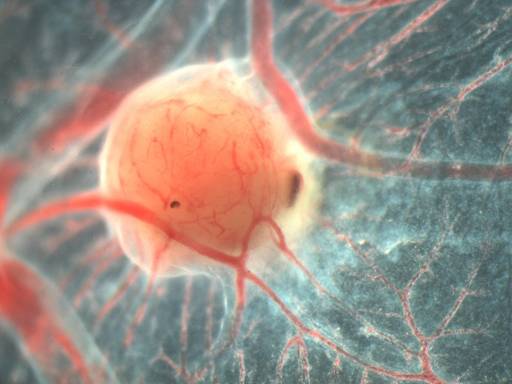A New Weapon In The War Against Cancer
Caspase-independent cell death as an alternative to chemotherapy.

It just makes sense: you don’t fire up a chainsaw when you need to trim your nails. By the same token, if the task at hand is treating cancer, you don’t use broad-spectrum chemotherapy when caspase-independent cell death (CICD) will get the job done, with greater efficacy and fewer side effects.
Developed by researchers at the University of Glasgow, CICD is the latest weapon in humanity’s ongoing war against cancer—a war that stretches back at least 1.7 million years. So far, the treatment has only been tested in the lab, and only against a single form of cancer (colorectal), so the usual “further research needed” caveat applies. But if it eradicates cancer cells in the real world as well as it does in the petri dish, the therapy represents new hope for the 14 million people who are diagnosed with various forms of the disease every year.
Most mainline cancer treatments encourage cancer cells to engage in a programmed death sequence known as apoptosis—a naturally occurring, controlled “cell suicide” that’s built into the DNA of all cells. Indeed, the key feature of cancer is the “bug” in such programming: when apoptosis goes awry, a tumour can grow exponentially, crowding out healthy cells and expanding throughout the body.
The therapy represents new hope for the 14 million people who are diagnosed with various forms of the disease every year.
While those therapies are often effective, they are blunt instruments—the chainsaw rather than the nail clippers. The treatments can cause painful side effects, or can even leave some cancerous cells untouched; those grow back, often stronger than before.
CICD doesn’t come with such side effects, since it avoids the activation of caspase, a key enzyme that initiates apoptosis. An added bonus: CICD triggers the dying cancer cells to release inflammatory proteins. This signal alerts the body’s immune system and enlists it as a powerful ally, ultimately allowing for a more thorough eradication of tumorous cells—something apoptosis-based therapies don’t do.
When it comes to cancer, it’s becoming increasingly clear that the ongoing search for a miracle drug is not unlike the search for El Dorado: a quixotic quest that demonstrates both the limits of our current thinking and the vastness of our hubris.
This is one of the most exciting aspects of CICD: it demonstrates what’s possible when we approach old problems in novel ways. In that sense, the cure may already be here—not for the disease, but for a way of thinking that has led us down the path of false hope so many times.
Photo via Flickr, UCI Research.
_______
Never miss a story. Sign up for NUVO’s weekly newsletter here.







